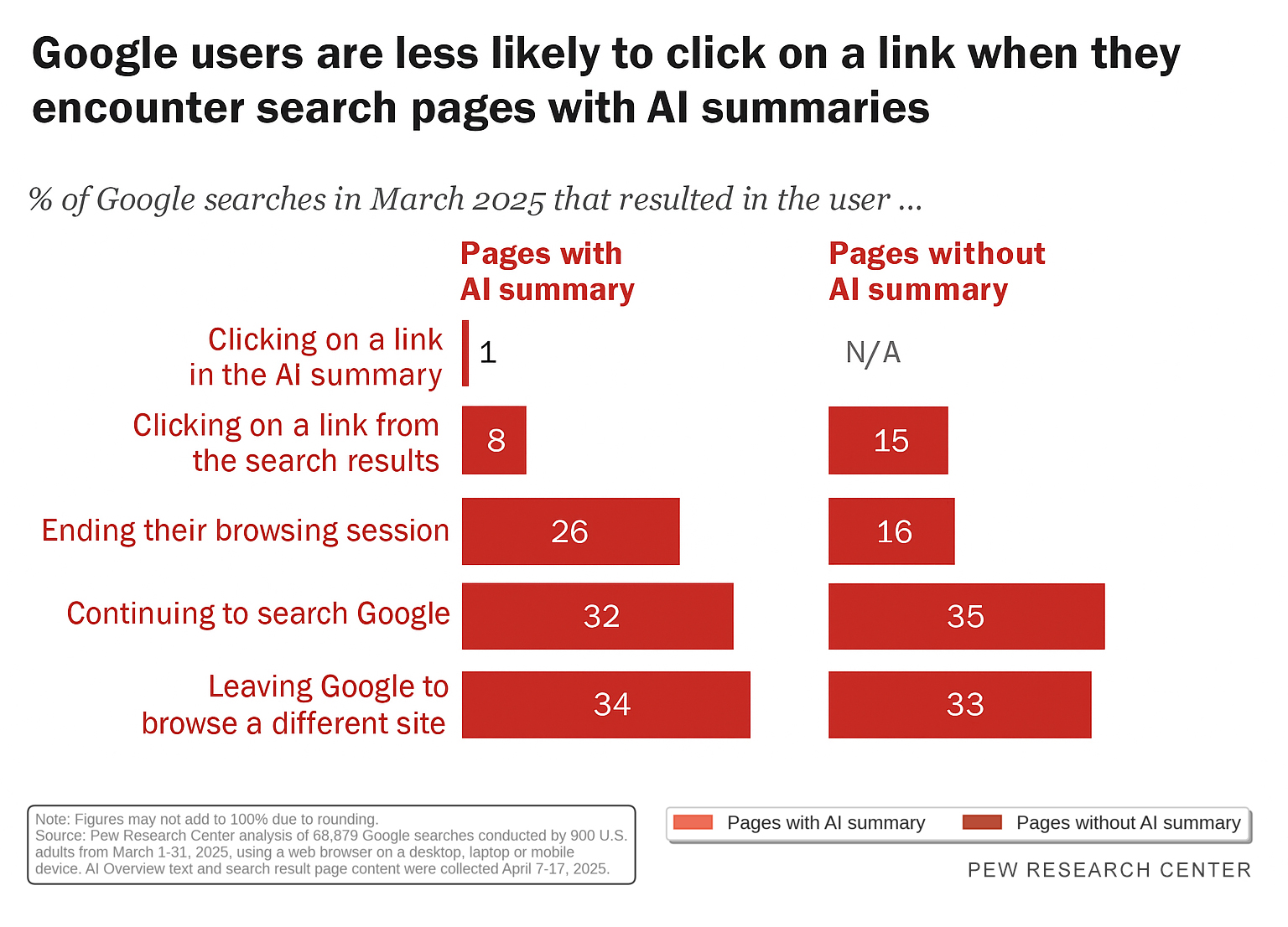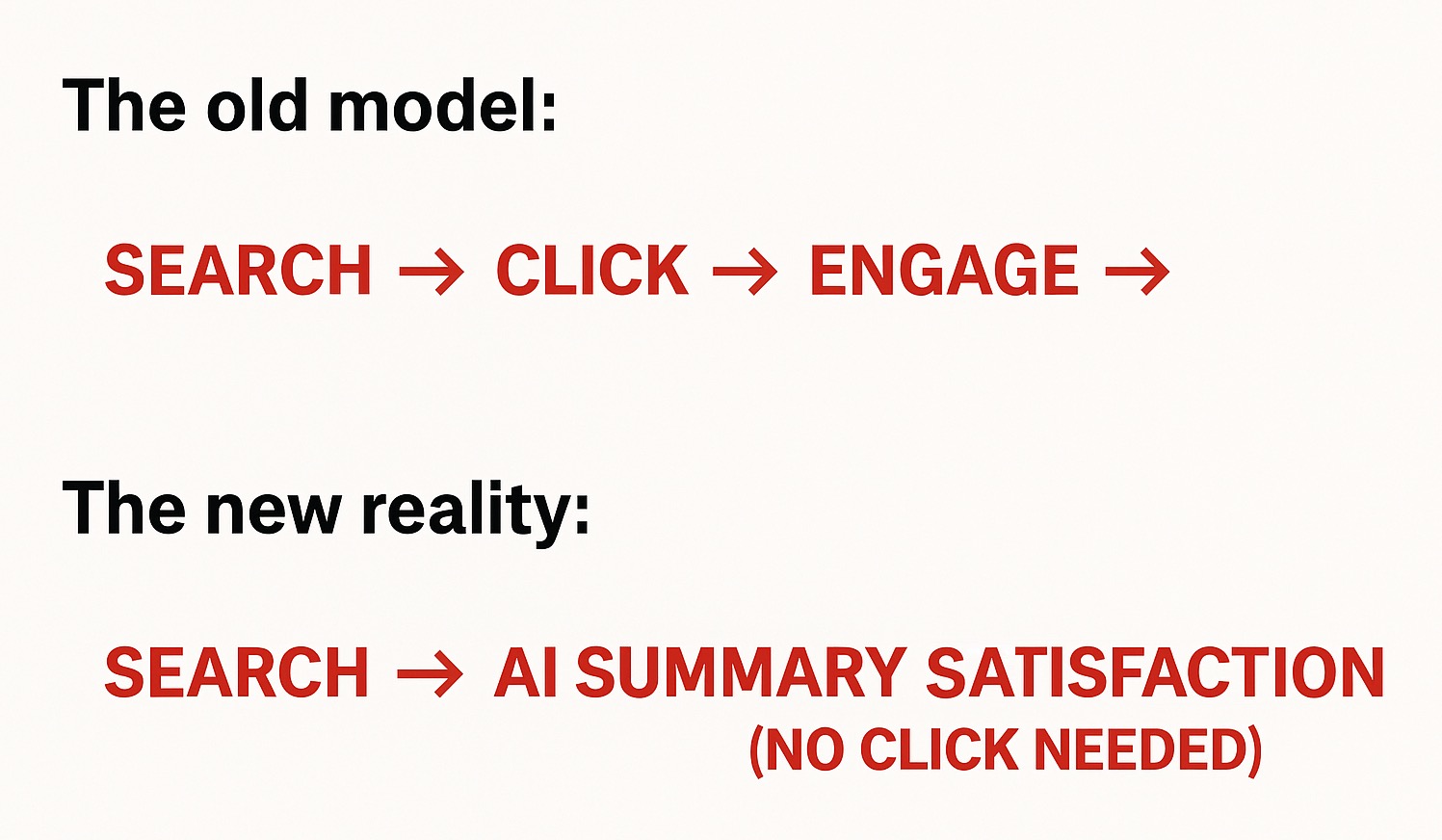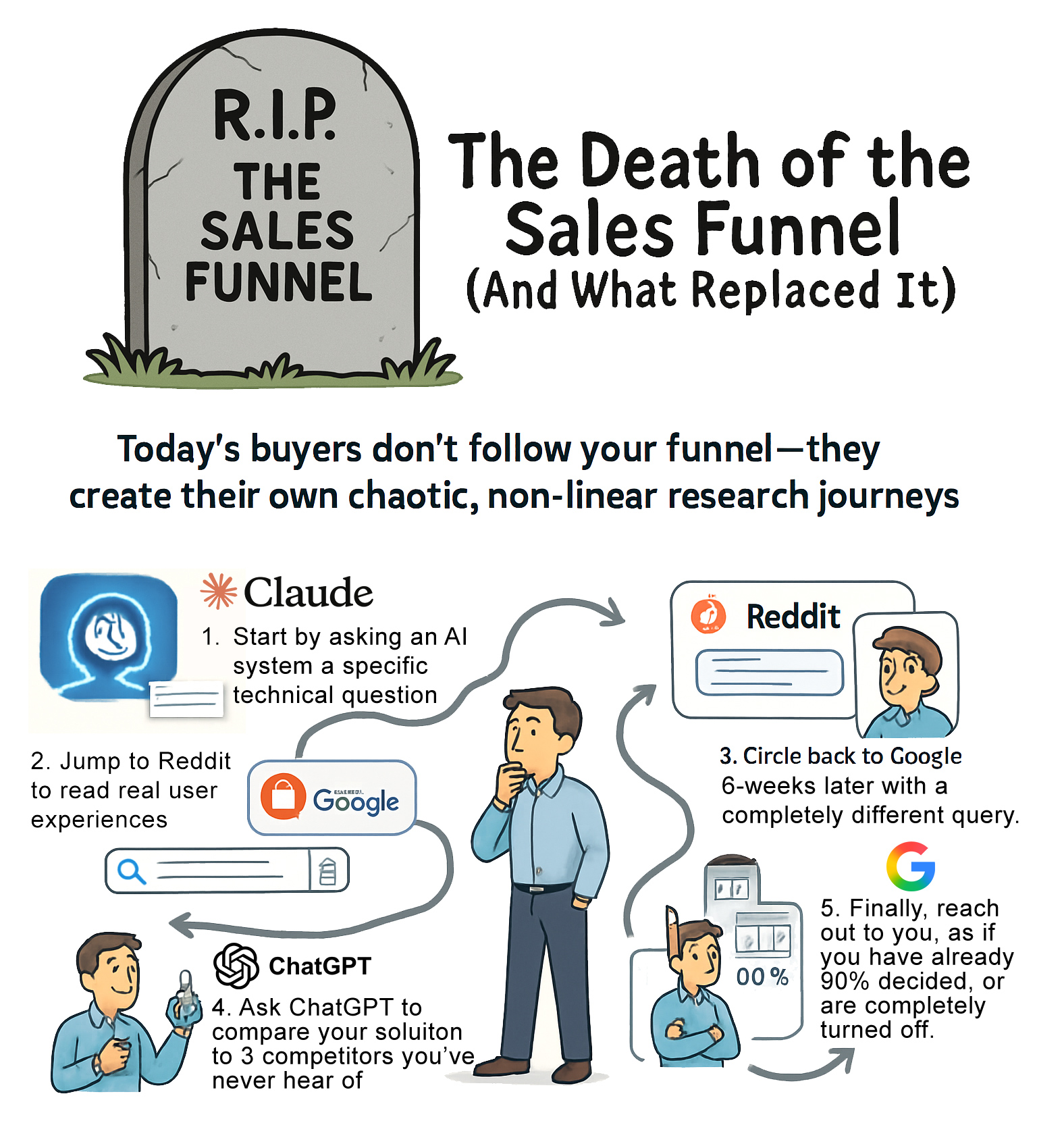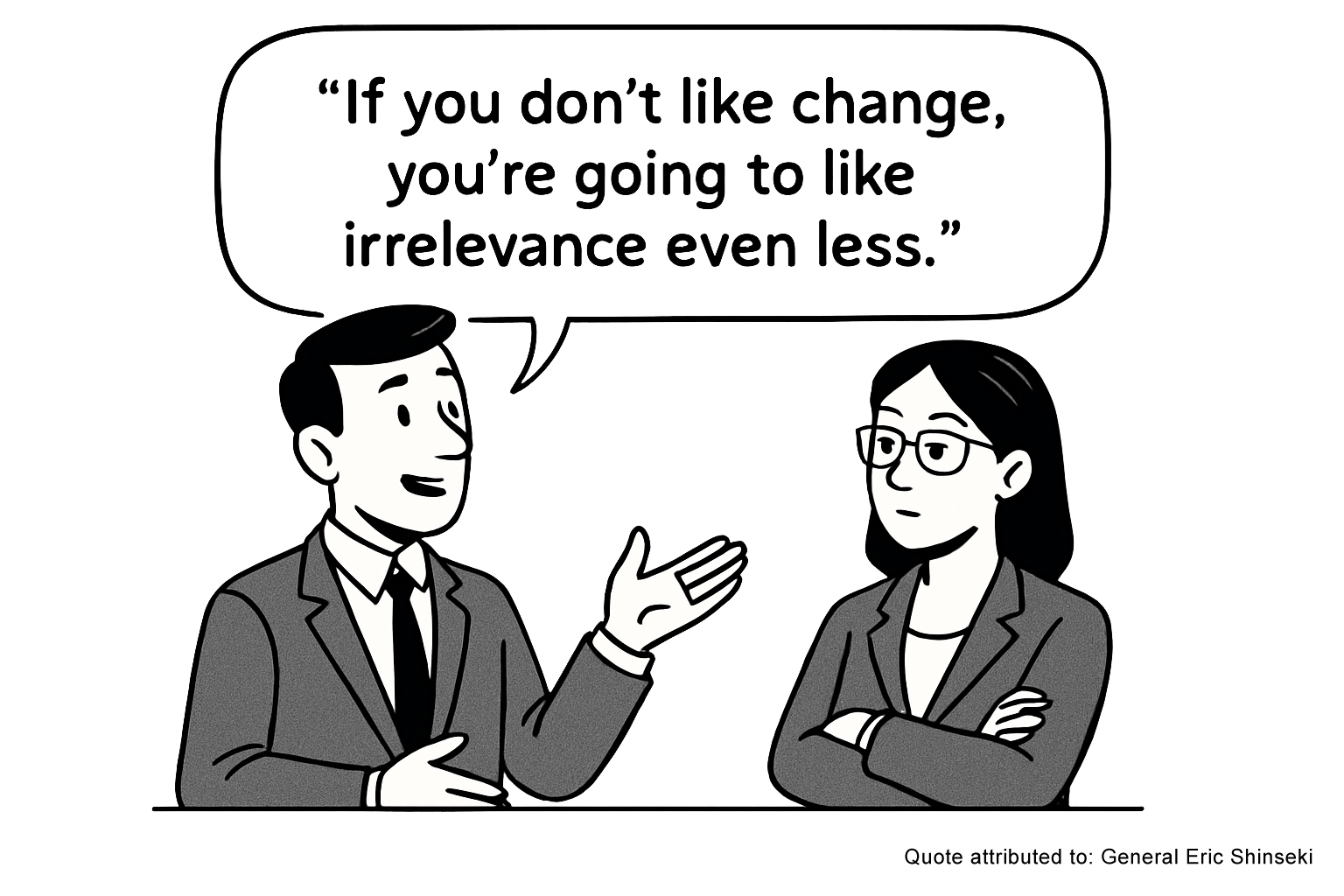Human Authored content draws from personal experience and creative intuition that AI cannot replicate, resulting in work with greater authenticity, emotional depth, and original perspective.
How AI Overviews are reshaping the digital landscape — and what savvy business owners are doing about it
If you’ve been wondering why your website traffic from Google has been declining despite your best SEO efforts, you’re not imagining things. A bombshell study from the Pew Research Center just confirmed what many business owners have been suspecting: Google’s AI Overviews are fundamentally changing how people interact with search results—and it’s not good news for most websites.
Here’s the reality check that should make every business owner pause: When Google shows an AI summary, users are 47% less likely to click through to any website.
(Note: The 47% figure represents the relative reduction in click-through rates: going from 15% to 8% represents approximately a 47% decrease (since 8/15 ? 0.53, meaning clicks dropped by about 47%).

The Numbers That Should Keep You Up at Night
The Pew study tracked 900 users across nearly 69,000 Google searches, and the results are stark:
Think about that for a moment. Google is essentially serving up your content, repackaged in their own interface, and users are satisfied enough that they rarely bother visiting your actual website. It’s like having a competitor set up shop right outside your store, offering free samples of your best products while customers walk past your entrance.
Google is essentially serving up your content, repackaged in their own interface, and users are satisfied enough that they rarely bother visiting your actual website. It’s like having a competitor set up shop right outside your store, offering free samples of your best products while customers walk past your entrance.
The Scope of the Problem
This isn’t happening on just a few searches. As of March 2025, AI Overviews appeared in roughly one out of every five Google searches. But here’s where it gets interesting—and more concerning for businesses:
What does this mean for your business? Those detailed, high-intent searches that typically convert well—the ones where customers are asking specific questions about solutions you provide — are increasingly being answered without users ever reaching your site.


I want to thank you personally for your leadership, insights and knowledge which allowed us the confidence to trust you as our fractional Chief Marketing Officer.
Because of you and your team our business has more than doubled over a relatively short period of time and so has my personal income.
I can’t tell you enough how grateful we are for what you have been able to accomplish for us and we want to continue to add to our marketing cost because our formula has been that
for every dollar we spend with you we are putting at least 5 back into our pocket AFTER we subtract what we spent.
That’s an amazing cost/benefit that I have never received before in any of our previous marketing endeavors. Feel free to use me as a reference.
I am happy to share our experience with anyone who is fortunate enough for you to take them on as a client.
Daniel C Goodwin
Provident 1031
Chief Investment Strategist
July 4, 2025
COMPLETE THE FORM TO
BOOK A STRATEGY CALL
"*" indicates required fields
Why Traditional SEO Metrics Are Becoming Meaningless
If you’re still measuring success primarily by organic click-through rates and search rankings, you’re using yesterday’s scorecard for tomorrow’s game.
The traditional SEO playbook assumed that ranking well meant getting clicks, and clicks meant business opportunities. But when 88% of AI Overviews cite three or more sources and synthesize that information into a single answer, the entire conversion funnel changes.

Google’s Response (And Why It Misses the Point)
Google’s response to the Pew study was predictably defensive, calling it “flawed methodology” and pointing to “billions of clicks” they still send to websites daily. But this response misses the fundamental issue entirely.
This isn’t about whether Google still sends some traffic—it’s about who gets that traffic and how the distribution is changing. When a restaurant critic reviews ten restaurants but only recommends one, it doesn’t matter that nine restaurants still get some customers. The game has fundamentally changed.
The Death of the Sales Funnel (And What Replaced It)
But there’s an even more fundamental shift happening that AI Overviews have accelerated: the complete breakdown of the traditional sales funnel.
The old model assumed you could guide prospects through predictable stages—awareness, consideration, decision. You controlled the information flow and the timing. Prospects moved linearly from not knowing about you to becoming customers.
That world is gone.
Today’s buyers don’t follow your funnel—they create their own chaotic, non-linear research journeys. They might:

What sales funnel? The buyer is in complete control from start to finish, and they’re interacting with your content—or your competitors’—at unpredictable moments and touchpoints.
This is why mediocre content isn’t just ineffective anymore — it’s actively dangerous. When a potential buyer encounters your content at any random point in their journey, that single interaction might be your only chance to influence their decision.
The Quality Paradox Every Business Owner Must Understand
Here’s the counterintuitive reality: while AI Overviews are killing click-through rates, they’re simultaneously making high-quality content more critical than ever before.
Think about it—when AI systems decide which sources to cite and trust, they’re not picking random websites. They’re selecting the most authoritative, comprehensive, and well-researched content available. The minimum standard for even being considered has skyrocketed.
This creates a fascinating paradox:
The businesses that understand this paradox are doubling down on content quality not for immediate traffic, but for long-term digital authority.
What Forward-Thinking Business Owners Are Doing Right Now
The businesses that thrive over the next few years won’t be the ones fighting to get back to 2023 traffic levels. They’ll be the ones who recognize that the attention economy has shifted and adapt accordingly.
1. Redefine success metrics
Stop chasing vanity metrics like search rankings and start focusing on:
2. Diversify your digital presence
The smart money is no longer going all-in on Google. Instead, successful businesses are building what I call “platform portfolios”:
3. Make quality content your competitive moat
This isn’t about SEO optimization anymore—it’s about becoming genuinely authoritative in your field. AI systems are remarkably good at distinguishing between surface-level content and deep expertise.
The new quality standard includes:
Remember: In a buyer-controlled world, every content interaction is a competitive evaluation. Buyers might encounter your content at any stage of their journey, compare it instantly to alternatives, and make snap judgments about your expertise. Your content isn’t just competing for search rankings—it’s competing for trust and authority in real-time decision making.
Then optimize for AI discovery:
Your content isn’t just competing for search rankings—it’s competing for trust and authority in real-time decision making.
COMPLETE THE FORM TO
BOOK A STRATEGY CALL
"*" indicates required fields
4. Build direct relationships
When search becomes less reliable for customer acquisition, direct relationships become more valuable:
The Uncomforable Truth About the Future
Here’s what most business owners don’t want to hear: this trend is likely to accelerate, not reverse. Google has every incentive to keep users on their platform longer, and AI capabilities will only improve.

The businesses that accept this reality and adapt will find opportunities that their competitors miss. The ones that keep fighting for yesterday’s traffic patterns will find themselves increasingly frustrated and relegated to irrelevance.
Your Next Steps
If this information has you concerned about your business’s future, good—that concern should motivate action. Here’s what you should do this week:
The digital landscape is shifting beneath our feet, but shifts create opportunities for those prepared to recognize them. The question isn’t whether AI will continue to change how people find information—it’s whether your business will adapt quickly enough to thrive in this new environment.
The companies that win won’t be the ones with the best SEO tactics. They’ll be the ones that build the strongest direct relationships with their customers and the most diverse presence across the platforms where attention is actually flowing.
What’s your plan for adapting to this new reality? The time to start is now.
COMPLETE THE FORM TO
BOOK A STRATEGY CALL
"*" indicates required fields






